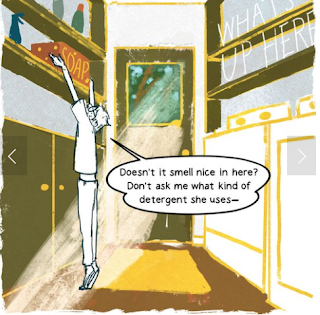Kit Anderson is one amongst essentially the most fascinating artists to emerge from CCS in recent years, as she’s been doing visually progressive and suave comics with uncommon issues. Anderson’s comics typically focus on the connection between reminiscence, persona, and a potential of space. Their Dwelling (a MICE mini-grant winner) is intensely grand about this. The unnamed narrator (presumably Anderson) is describing, from reminiscence and nothing else, the look of a home whose householders are unspecified, however the conclusion once extra is that or now not it is her grandparents’ home. Right here’s a comic-as-design, a spellbinding subgenre that connects the concept of a descriptive scheme with an emotionally revealing drawing. The narrator goes room by room, describing them by reminiscence. Basically the most evocative rooms enjoy smells linked to them (like the laundry room) or repeated, elegant memories of feeling win and cherished. To characterize her comprise ghostly presence as a narrator, Anderson attracts herself as a kid in a cartoony vogue in shadowy & white, whereas the home itself is in sparkling and varied color. There are some memories the narrator clearly makes an try to push apart, whereas they care for others tight, corresponding to a Parcheesi board and the kitchen she performed it in. Indubitably one of Anderson’s extensive strengths is formal curiosity blended with emotional resonance, and this comic, modest as it is in its ambitions, is a ideally suited example of this.
Andy Lindquist’s comic What You Owe And What You Bear is a grand sage now not real about being trans but about what it manner to be gendered as a girl. Lindquist’s fable train is assured and grand, whereas their line, though mostly spare, does the job in expressing the ceaselessly awkward and terror-producing eventualities that he chanced on himself in ahead of his transition. The comic takes a arduous see at Lindquist’s teenage years as a self-described “swish younger girl” who used to be the appropriate soprano in college. Lindquist notes that a fable that typically forms around trans men is that of cis americans mourning the lack of a swish girl, which Lindquist cynically describes as a “public gorgeous.” This gets into now not real the male stare and being desired as an object (though that’s a colossal allotment of it), but moreover an working out of being an exemplar for cis ladies americans as smartly. Mostly though, as Lindquist explains by strategy of the many arias that comprise ladies americans being objects of desire the save the tip end result of that desire is quite always damage or loss of life, he had no thought of what it formerly meant to be a girl without needing to endure that constant, unrelenting burden. The thematic and ornamental touches of the comic heighten its issues, with the swelling aria matching the nearly inchoate rage and doubt that had plagued them.


